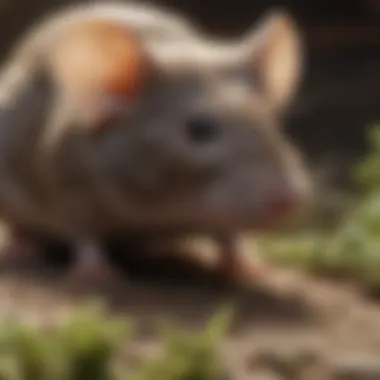Natural Mice Deterrents: The Power of Essential Oils


Intro
Mice infestations can cause considerable distress for homeowners. The presence of these pests is not merely an annoyance; they can pose serious health risks and contribute to property damage. Understanding how to keep mice at bay is essential for maintaining a safe and clean environment. One effective strategy is the use of essential oils. This article will explore various aspects of essential oils as a natural deterrent against mice. It will delve into the chemical properties of these oils, their effectiveness, and how to apply them for optimal results.
By integrating essential oils into pest management practices, homeowners can create an eco-friendly approach that minimizes the reliance on harsh chemicals.
Understanding the Pest
Identification
Mice are small rodents commonly found in homes. The two most frequently encountered species are the house mouse and the field mouse. House mice are typically gray or brown with a pointed snout, while field mice often have a lighter coloration. Observing droppings, gnaw marks, or nesting materials can be indicators of an infestation.
Life Cycle
The life cycle of mice is rapid, with a female mouse capable of producing several litters per year. Each litter can contain five to ten young mice. This quick reproduction rate makes it vital to manage infestations quickly to prevent population surges. Young mice reach maturity within a few weeks, further compounding the problem.
Pest Prevention Strategies
Environment Modification
Preventing mice from entering your home requires modifications to the environment. Keeping food sealed in containers and maintaining a clean household can minimize attraction. Additionally, ensuring that all gaps and cracks are sealed can help keep these pests out.
Physical Barriers
Physical barriers are an effective way to deter mice. Installing metal mesh in holes or using mouse traps strategically placed can significantly reduce the chances of infestation. Regular inspections of entry points are also essential to identify potential vulnerabilities.
Control Methods
Chemical Control
While chemical control methods are widely used, many homeowners prefer natural alternatives. The fear of using harsh chemicals, which can be hazardous to pets and children, leads many to explore safer options like essential oils.
Biological Control
Biological control methods focus on enhancing natural predators. However, this may not always be practical within a household setting. Hence, understanding the combination of natural deterrents, like essential oils, is crucial for effective management.
Mice respond strongly to different scents, and using natural deterrents can help keep them away without the use of toxic chemicals.
Prolusion to Mice and Their Behavior
Mice are common pests that can pose significant challenges for homeowners. Understanding their behavior is crucial in developing effective strategies to deter them. This section will provide a comprehensive overview of mice species, their habits, and how they react to different scents. Knowledge in these areas is fundamentally important, particularly when considering natural alternatives like essential oils for pest control.
Overview of Mouse Species
Mice belong to the family Muridae, with key species commonly associated with human habitation being the house mouse, the deer mouse, and the white-footed mouse. The house mouse, Mus musculus, is the most notable due to its adaptability to various environments. Understanding these species allows homeowners to identify specific traits and behaviors that may influence control strategies.
For instance, house mice are small, typically measuring around 2.5 to 4 inches in length. They have a high reproduction rate, which can lead to rapid population growth if not managed. Each species has distinctive behaviors. Deer mice prefer outdoor nesting, while house mice often seek shelter in homes.
Understanding Mice Habits and Preferences
Mice are nocturnal creatures, mainly active during the night. They are curious and tend to explore their surroundings, a behavior that may lead them into traps or deterrents. These rodents are also known for their strong foraging instincts, driven by a need for food and shelter. They can consume various food, with a preference for grains and seeds.
Understanding their dietary preferences is crucial. Homeowners can minimize attractions by storing food in airtight containers and sealing potential entry points. Furthermore, mice seek warmth and safety; therefore, attics and basements are common nesting sites, making microhabitat awareness pivotal.


Behavioral Response to Smells
Mice have a well-developed sense of smell that plays a critical role in their survival. They utilize scent to detect food, identify territories, and communicate with each other. Essential oils can disrupt these behaviors due to their strong odors.
Research indicates that certain essential oils, such as peppermint and eucalyptus, can deter mice effectively. When exposed to these scents, mice often exhibit avoidance behaviors. They may become disoriented, leading them to retreat from areas where these oils are present.
"Understanding the behavioral response to scents not only aids in choosing the right essential oils but also informs their application in pest control strategies."
By recognizing the power of scent, homeowners can employ essential oils as a natural deterrent. As we delve deeper into the science of essential oils, their composition, and their mechanisms in repelling mice, it will become evident why this approach may be beneficial in maintaining a pest-free environment.
The Science of Essential Oils
Understanding the science of essential oils is essential to grasp how these natural substances can be employed as effective deterrents for mice. Essential oils possess unique characteristics that make them valuable in the realm of pest control, especially when discussing methods that align with ecological principles. The exploration of their composition, effects on rodents, and mechanism of action is necessary to assess how they can be utilized effectively in a home environment.
What Are Essential Oils?
Essential oils are concentrated hydrophobic liquids that contain volatile chemical compounds from plants. These oils often reflect the smell and flavor of the plant from which they are derived. Distillation is the most common method used to extract these oils, yielding a potent substance that encapsulates the essence of the source plant. They are widely employed in aromatherapy, cosmetics, and now as potential natural repellents against pests like mice. The allure of essential oils lies in their dual capacity to impart pleasant aromas while possessing the ability to influence animal behavior.
Chemical Composition of Essential Oils
The chemical makeup of essential oils is diverse, comprising various organic compounds such as terpenes, alcohols, esters, and aldehydes. These compounds contribute to the unique fragrance of each oil and play a crucial role in their effectiveness as deterrents. For instance, peppermint oil contains menthol, while clove oil is rich in eugenol. These constituents can trigger strong aversive responses in mice. Understanding the specific components helps in selecting the right oils to apply in pest management strategies, as different compounds can induce varying levels of effectiveness against rodents.
"The complexity of essential oils allows for targeted applications depending on the pest behavior observed."
Mechanisms of Scent Perception in Rodents
Rodents, including mice, rely heavily on their olfactory senses to navigate their environment. Their ability to detect and interpret smells is far superior to that of humans. Mice possess a unique olfactory system that can distinguish between numerous compounds, making them particularly susceptible to the scents emitted by essential oils. When exposed to various essential oils, mice exhibit avoidance behaviors, often retreating from areas treated with strong-smelling substances. Understanding these mechanisms highlights the potential of essential oils not just as a deterrent, but also as a means to alter mice behavior in ways that direct them away from residential areas.
Essential Oils that Repel Mice
The topic of essential oils that repel mice is crucial in exploring natural pest control methods. The increasing preference for eco-friendly solutions has led many to consider these oils as viable alternatives to chemical repellents. Essential oils provide a dual benefit: they can effectively deter mice and contribute to a more pleasant home environment by introducing natural scents. This section will delve into some popular essential oils, highlighting their properties and effectiveness against mice.
Peppermint Oil
Peppermint oil ranks high among essential oils known for repelling mice. The strong, menthol scent is particularly unappealing to rodents. Studies have indicated that mice often avoid areas infused with peppermint oil, as the odor is overwhelming to them.
To utilize peppermint oil, homeowners can soak cotton balls in the oil and place them in strategic areas like attics, basements, and entry points where mice are likely to intrude. Benefits include its accessibility, affordability, and the pleasant smell it leaves behind. However, it is important to reapply the oil regularly to maintain its efficacy, as the scent tends to dissipate over time.
Eucalyptus Oil
Eucalyptus oil is another essential oil that has been found to possess mouse-repelling properties. The strong aroma is associated with freshness but is known to deter rodents. Eucalyptus oil can be used similarly to peppermint oil, through diffusing or direct application in key areas of the house.
Its advantages extend beyond merely repelling mice; eucalyptus oil has antibacterial properties, contributing to a cleaner home environment. Keep in mind that the application should be monitored since even though it is effective, its smell can be overwhelming if used excessively.
Lavender Oil
Lavender oil is often celebrated for its calming properties, but it can also serve a practical purpose. The scent of lavender is known to repel mice, making it a useful tool in pest management. In addition to deterring rodents, lavender oil can create a soothing atmosphere in your home, bridging the gap between pest control and indoor comfort.
Applying lavender oil can be conducted through essential oil diffusers or by placing sachets filled with dried lavender buds in common entryways. Its dual-use nature makes it a popular choice among homeowners. However, it's worth noting that while some may find the scent pleasant, others could be indifferent or even dislike it.
Cinnamon Oil
Cinnamon oil offers a strong scent that mice find repulsive. The aroma not only serves as a deterrent but also leaves a warm, inviting fragrance that many appreciate in their homes. It can be less known than peppermint or eucalyptus but is equally effective.
Homeowners may use cinnamon oil in various methods, such as adding it to cotton balls or using it in sprays. Though it is effective, caution is advised around pets and small children, as the strong scent can be irritating if not used sparingly.


Clove Oil
Clove oil has powerful odor-making it another effective option to repel mice. The compound eugenol, present in clove oil, is particularly distasteful to rodents. Its strong scent can serve as an effective barrier in multiple areas of the home.
Applying clove oil can involve soaking cloths or cotton balls and placing them in areas of activity or infestation. It is worth considering that clove oil is often more potent and may overpower other scents in the home. For this reason, moderation in its application is advised.
In summary, selecting the right essential oil can significantly impact pest management efforts. Each oil has unique properties that can both repel mice and enhance the living environment. Regular application and careful placement are essential for maximizing their effectiveness.
Essential oils represent a natural and potentially effective option for repelling mice. Homeowners can experiment to discover which oils suit their preferences while effectively keeping unwanted rodents at bay.
How Essential Oils Impact Mice
Understanding how essential oils impact mice is crucial for utilizing them effectively in pest management. Homeowners seek solutions that are not only efficient but also eco-friendly. Essential oils can provide a natural deterrent to mice without the adverse effects associated with chemical agents. This section explores the physiological reactions and behavioral alterations in mice induced by these oils. Both aspects are paramount for comprehending the overarching effects of scent on rodent populations.
Physiological Reactions to Scents
Mice have a well-developed sense of smell, which is essential for their survival. They rely on olfactory cues to find food and avoid predators. When exposed to essential oils, physiological reactions may occur. For instance, the strong odor of peppermint oil can lead to irritation of the olfactory receptors in mice. This irritation may trigger a defensive response, causing the mice to flee the area.
In various studies, it has been observed that certain scents can elevate stress hormones in mice. The reaction can result in rapid heart rate or increased movement. In a natural setting, these responses serve to enhance survival chances. Moreover, lavender oil, while pleasant to humans, may induce a calming effect in higher concentrations. The impact of essential oils is not simply about repelling; it also can influence overall well-being in rodents.
"Essential oils can change the modern approach to pest management by offering safer alternatives to traditional chemicals."
Behavioral Alterations Induced by Essential Oils
The behavioral shift in mice exposed to essential oils can provide insightful information for pest control strategies. Research shows that when essential oils are present, mice may alter their foraging habits. Instead of venturing freely for food, they might become skittish and less exploratory, avoiding areas with strong scents.
Additionally, essential oils can introduce changes in social behavior among rodents. Mice typically use scents for communication. However, when a strong odor is introduced, it may mask pheromones crucial for social interactions. This disruption can lead to a breakdown in their social structure, causing them to retreat.
Furthermore, the consistent presence of scents can create a conditioned aversion to specific environments. Over time, mice may learn that particular areas are associated with unpleasant smells, prompting them to avoid these zones. This behavior can be effectively leveraged by homeowners who strategically place essential oils in key locations around their property.
In summary, the physiological and behavioral impacts of essential oils on mice are significant. Understanding these effects aids in developing practical applications for these natural repellents, enhancing pest management strategies.
Methods of Application
The application of essential oils as a method to deter mice is a crucial aspect of using them effectively in pest management. Understanding the different methods of application ensures that homeowners can maximize the benefits of these natural deterrents. Each method has unique advantages that can contribute to a comprehensive strategy in repelling mice. Key elements to consider include the ease of use, effectiveness, and safety for both humans and pets.
Diffusion Techniques
Diffusion is a technique that allows essential oils to spread odors throughout a room or area. This method can be particularly effective in creating an environment that is inhospitable to mice. There are several ways to diffuse essential oils:
- Essential Oil Diffusers: Using an electronic diffuser or a simple candle diffuser is popular. These devices disperse the oil into the air, allowing it to reach various corners of a room.
- Cotton Balls or Rags: Soaking cotton balls or rags in essential oils and placing them strategically around areas where you suspect mouse activity can also create an effective barrier of scent.
- Spray Bottles: Mixing essential oils with water in a spray bottle allows for easy application. Homeowners can spray this mixture in specific areas like baseboards, corners, and entry points.
Diffusion techniques not only help in repelling mice but they also can freshen the air in the home. A well-dispersed scent works to mask the scents that might attract mice. Therefore, regular diffusion can be a part of an ongoing pest management routine.
Direct Application Areas
Direct application focuses on applying essential oils to specific surfaces or areas that mice frequent. This is critical in ensuring that the oils come into contact with mice directly or their pathways. Effective areas include:
- Entry Points: Doors, windows, and other potential entry points should be treated. Applying oils here directly may deter mice from even entering.
- Nest Locations: If there are signs of nesting, applying essential oils around these areas can disrupt the environment they feel safe in.
- Corner Areas: These are common places where mice travel and hide. Conditioning these corners with oils can alter their path, effectively pushing them away.
The direct application of essential oils is a targeted approach, emphasizing areas of known mouse activity. Homeowners should rotate oils used in these locations to deter any possibility of mice becoming accustomed to a single scent.
Creating a Barrier with Essential Oils


Creating a barrier with essential oils involves strategically placing the oils in a way that forms a protective line against mice. This method enhances the effectiveness of deterrents by reinforcing areas where mice might enter.
- Outdoors: Applying essential oils, such as peppermint or eucalyptus around the perimeter of the home creates a boundary that is inhospitable to mice.
- Indoors: This can be echoed inside the house by placing oils in areas like the base of cabinets and under sinks. These barriers can help prevent mice from moving freely between rooms.
A well-established barrier not only discourages mice but serves to send a clear signal that certain areas are undesirable. The effectiveness of this method lies in consistency; regular reapplication is necessary to maintain the boundary.
Effective use of essential oils can complement other pest control measures, leading to a more holistic approach to managing mice deterrents.
The choice of method should correspond to specific needs and the nature of the mouse problem at hand. Understanding these application methods can provide homeowners with the necessary tools to foster a pest-free living environment.
Efficacy and Studies
The efficacy of essential oils as a deterrent for mice is a central focus of this article. Understanding how these natural substances can influence mouse behavior is essential for homeowners looking for effective pest management strategies. Numerous studies have investigated the effectiveness of essential oils in repelling mice, revealing insights into their chemical properties and the biological reactions of rodents to these scents. Instead of relying solely on chemical repellents, many have turned to essential oils for a more eco-friendly approach.
Research on Essential Oils and Mice
Research has highlighted various essential oils, such as peppermint, cinnamon, and eucalyptus, which demonstrate potent repelling effects on mice. Several scientific studies have been conducted to evaluate these oils, focusing on their active compounds. For instance, peppermint oil contains menthol, a component known for its strong odor that disrupts the olfactory senses of mice. Studies suggest that exposure to peppermint oil can lead to increased avoidance behavior, making it a popular choice for repelling these pests.
A critical analysis of research shows varying degrees of efficacy among different oils. A study published in the Journal of Essential Oil Research found that cinnamon and clove oils, due to their strong fragrance, also produced promising results in deterring mice. The methodology often involves controlled environments where rodents are exposed to specific essential oils and monitored for changes in behavior. Results typically indicate a significant reduction in mice activity in areas where these oils are applied, supporting their use in pest management.
Comparative Analysis with Chemical Repellents
When comparing essential oils to traditional chemical repellents, the findings are noteworthy. Chemical repellents often contain synthetic compounds that may pose health risks to humans and pets. In contrast, essential oils are derived from natural sources, making them generally safer options for households, especially those with children and pets.
Moreover, studies have shown that while chemical repellents may provide immediate results, their effectiveness diminishes over time, requiring regular reapplication. Essential oils, however, can offer lasting results when applied correctly. However, it is essential to recognize the limitations as well. Not all essential oils are equally effective for every household situation. Personal preferences, environmental considerations, and the type of mouse species also play a key role in their success.
"Using essential oils is not just a trend; it represents an informed choice toward a safer and more sustainable approach to pest control."
Precautions and Considerations
In the pursuit of a pest-free environment, the use of essential oils can prove to be a necessary strategy for homeowners. However, it is essential to understand the precautions and considerations that accompany this method. By doing so, one can maximize benefits while minimizing risks. The interplay between nature and health should always be at the forefront when selecting pest control solutions.
Potential Risks to Humans and Pets
Essential oils are often considered safe, but they are not without potential risks. Many essential oils are highly concentrated substances that may cause irritation or allergic reactions in some individuals. For instance, peppermint oil, while effective for mice, can lead to respiratory issues in cats and can be toxic if ingested in large quantities. It's imperative to always dilute essential oils properly before application, especially in homes with pets or children.
Before using any essential oil, it is advisable to test the product on a small area. This allows one to observe any immediate reactions. Furthermore, when using diffusers or sprays, ensure that pets are kept in a separate room until any potential reactions to the scents have been evaluated.
"Essential oils hold remarkable potential, yet they demand respect and careful handling to ensure safety for all household members."
Environmental Impact of Essential Oils
While essential oils are a more eco-friendly option than many chemical pesticides, their use is still not without ecological implications. Some essential oils can affect local flora and fauna when discharged into the environment. For instance, high concentrations of certain oils might disrupt local insect populations, which may have broader implications for the ecosystem.
Thus, one must consider the following when using essential oils:
- Assessing Local Wildlife: Understand the surrounding environment. This includes knowing what wildlife may come into contact with the scents.
- Responsible Sourcing: Choose essential oils that are sustainably sourced. This adds a layer of responsibility toward conservation.
- Usage Frequency: Frequent application can lead to build-up in the environment, impacting both the desired pest population and native species.
End
Summary of Findings
The research presented in this article illuminates not only which essential oils are effective in repelling mice—such as peppermint, eucalyptus, and lavender—but also delves into the underlying science. Understanding the physiological and behavioral reactions of mice to different scents offers homeowners practical knowledge for implementation. Essential oils, due to their strong odors, disrupt the sensory navigation of mice, leading to avoidance and, ultimately, a reduction in their invasion. Thus, integrating these natural oils into pest management can be both a cost-effective and environmentally conscious strategy.
Future Research Directions
Looking ahead, there are various avenues for further investigation. More extensive studies on the efficacy of essential oils in real-world scenarios could provide clearer insights into their long-term effectiveness. Research could also explore combinations of different oils or blends to enhance repellency. Additionally, understanding the impact of essential oils on other pests may widen their application in pest control. Lastly, investigating user-friendly methods of essential oil application can help better engage homeowners in adopting these natural solutions.
"Essential oils, while effective, require careful consideration in their application to ensure both efficacy and safety."
By prioritizing both ecological integrity and pest management efficiency, future work can contribute to developing comprehensive strategies for managing mouse populations more sustainably.







